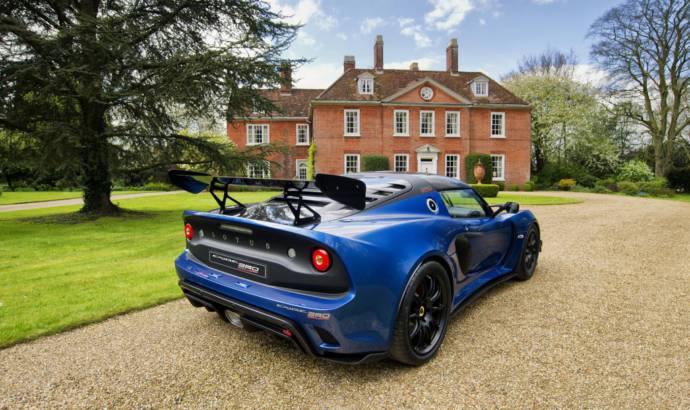Lotus is extending its performance offer for the clients who love to drive cars on track. The UK-based manufacturer unveiled the new Exige Cup 380, a car that is evolved from the Exige Sport 380. Eligible for competition, just 60 editions of this extreme Exige are planned for worldwide markets.
With a power-to-weight ratio of 355 hp per tonne, the Exige Cup 380 delivers genuine race pace, with 0-60 mph in 3.4 seconds (0-100 km/h in 3.6 seconds) and top speed of 175 mph (282 km/h).
Key to the Exige Cup 380 reaching its low weight of 1,057 kg is the comprehensive adoption of carbon fibre and extreme engineering. Making their first appearance on a road-going Lotus, heavily revised bodywork elements contribute to the increased downforce of the Exige Cup 380, with the car generating up to 200 kg, 43% more than the Exige Sport 380.
There are four user selectable ESP modes (Drive, Sport, Race and Off). Sport, Race and Off increase throttle response, lower traction slip thresholds and remove understeer recognition to provide a finer degree of driver control before intervention and utilises an engine exhaust bypass valve which reduces exhaust back pressure at higher engine speeds.
In a new development, the Lotus Exige Cup 380 includes a variable traction control function which is linked directly to the ECU and allows the amount of wheel slip to be set by the driver. The six-position rotary switch is located on the steering column and is only available with ESP switched off, with the percentage of target wheel slip from 1% to 12% in five settings and “off”, displayed via the instrument cluster.
Making the most of this aerodynamic downforce and maximising mechanical grip, the Exige Cup 380 features larger rear tyres (285/30 ZR18 Michelin Pilot Sport Cup 2) as standard.
In addition to the Exige’s strong, stiff and durable aluminium chassis architecture, the Cup 380 comes with a T45 steel roll over bar as standard.





